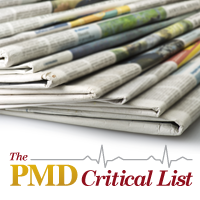- Revenue Cycle Management
- COVID-19
- Reimbursement
- Diabetes Awareness Month
- Risk Management
- Patient Retention
- Staffing
- Medical Economics® 100th Anniversary
- Coding and documentation
- Business of Endocrinology
- Telehealth
- Physicians Financial News
- Cybersecurity
- Cardiovascular Clinical Consult
- Locum Tenens, brought to you by LocumLife®
- Weight Management
- Business of Women's Health
- Practice Efficiency
- Finance and Wealth
- EHRs
- Remote Patient Monitoring
- Sponsored Webinars
- Medical Technology
- Billing and collections
- Acute Pain Management
- Exclusive Content
- Value-based Care
- Business of Pediatrics
- Concierge Medicine 2.0 by Castle Connolly Private Health Partners
- Practice Growth
- Concierge Medicine
- Business of Cardiology
- Implementing the Topcon Ocular Telehealth Platform
- Malpractice
- Influenza
- Sexual Health
- Chronic Conditions
- Technology
- Legal and Policy
- Money
- Opinion
- Vaccines
- Practice Management
- Patient Relations
- Careers
The PMD Critical List: Which Payers Do Physicians Trust Most?
As more and more health insurers merge, a new survey asks which payers do right by physicians most often, and which cause the most frustration. That story tops this week's PMD Critical List. Also on the list, a fact-check of Hillary Clinton on drug prices, and a closer look at the aforementioned mega-mergers in healthcare.

As more and more health insurers merge, a new survey asks which payers do right by physicians most often, and which cause the most frustration. That story tops this week's PMD Critical List. Also on the list, a fact-check of Hillary Clinton on drug prices, and a closer look at the aforementioned mega-mergers in healthcare.
• Which Payers Do Physicians Trust Most? (Becker's Healthcare)
A new survey “measures physician trust in payers based on a plan's efforts to honor commitments, honestly and accurately represent itself and its intentions, and to not take advantage of physicians.” The “trust index” winner: Blue Cross Blue Shield plans.
• Doctors Are Afraid of the Word “Death” (The Washington Post)
A psychiatry professor and medical ethicist says death is “a word that physicians almost never use—often playing elaborate language games to avoid it.” And while we “now live in a death-denying culture” doctors need to learn to better accompany their patients through the dying process.
• A Clintonian Misdirection on Drug Prices (The Wall Street Journal)
A stimulating rip-job on Hillary. The “high drug prices she decries aren’t the result of market forces gone wild. Rather, they are the result of bad regulation that has created market failures and shortages.” FYI: “On average, it takes about 50 months for the FDA to approve a single generic application.”
• Time to Start Videotaping Surgical Procedures (MinnPost.com)
“Healthcare can benefit from the power of cameras to improve accountability,” argue Johns Hopkins surgery professors in a provocative BMJ commentary. He makes a case for “The Hawthorne (or observer) effect”—the phenomenon by which people modify their behavior (usually for the better) once they know they are being observed.
• Bacon Causes Cancer? When Pigs Fly! (New York Post)
“The question to ask yourself when one of these studies comes out is not whether something ever causes cancer, but how likely it is do so. Yet the media have shown little interest in the absolute risk of consuming red and processed meat, instead preferring ludicrously misleading summaries and downright falsehoods.”
• Why Doctors Still Misunderstand Heart Disease in Women (The Atlantic)
Heart disease is now the leading cause of death for US women—many have symptoms that fall outside what’s currently considered typical and women are also less likely to get tested for heart-related illnesses. It will take time to “erase centuries of bias—not only within the medical community, but among women themselves.”
• Healthcare Companies in Merger Frenzy (The New York Times)
Nearly $300 billion in health-related mergers and acquisitions have been done in 2015, easily outpacing activity in recent years. “Low interest rates and cheap capital are fueling activity across many industries, but health care is especially devoted to the mantra that bigger is always better.”
• Physicians Becoming Data Collectors (Becker's ASC Review)
Physicians often claim electronic health records significantly add to their workload and administrative tasks. A recent study found that found that the average physician spends 43% of their time on data entry and a mere 28% of their time with patients.”
• Minority Patients Less Likely to Trust Physicians (EurekAlert!)
A new Emory University study finds that “unlike whites, Latinos and blacks are more likely to report believing that doctors don't see them as equals or were less concerned for their wellbeing.” Lacking an emotional connection with their doctor, creates less buy-in from the patient.
